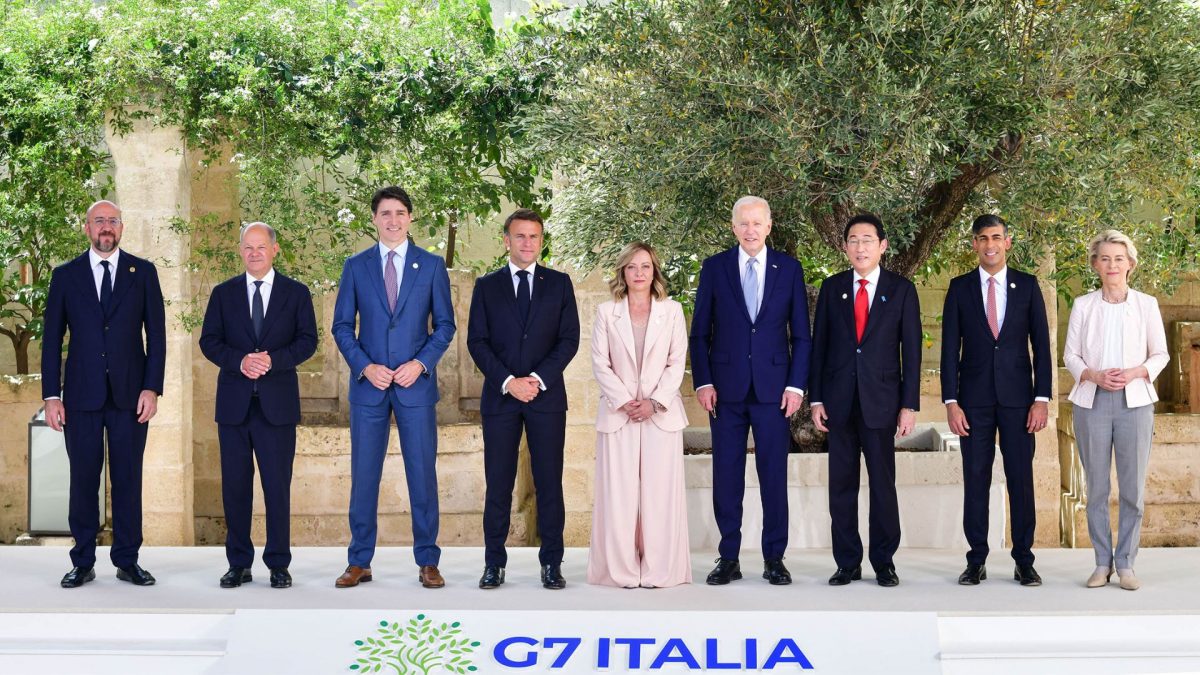The G-7 leaders have accused China of enabling the Russian war on Ukraine.
While Russia has been the common traditional adversary of the bloc in many recent summits, China too has emerged as one in this year’s G-7 Summit in Italy.
Since the Russian invasion of Ukraine, China has emerged as the principal partner of Russia that has supplied dual-use supplies used in making arms and ammunitions. While no overt arms sales have happened, such dual-use supplies have helped Russia shore up weapons manufacturing that has in turn driven the war on Ukraine.
Mincing no words, US President Joe Biden said while China is not providing Russia weapons, it is providing Russia the “ability to produce those weapons”.
“China is not supplying weapons but the ability to produce those weapons and the technology available to do it. So, it is, in fact, helping Russia,” said Biden.
In the joint statement, the G-7 members clubbed China among the countries providing “material support Russia’s war machine”. While China has provided non-lethal support to Russia, North Korea and Iran have provided Russia with missiles, drones, and other weapons that have been directly used against Ukraine.
“We will continue taking measures against actors in China and third countries that materially support Russia’s war machine, including financial institutions, consistent with our legal systems, and other entities in China that facilitate Russia’s acquisition of items for its defense industrial base,” said the statement.
‘China enabling Russia’s illegal war’
In the joint statement, the G-7 members said that the Chinese support was enabling Russia’s illegal war on Ukraine.
Since Russia attacked Ukraine in February 2022, China has provided goods such as spare parts to be used in missiles, semiconductors, and raw material for making ammunition and artillery shells. Russia has also become a destination for Chinese consumer goods as the supply from elsewhere has been curtailed amid mounting sanctions. In turn, China has also got cheap energy supplies from Russia.
Impact Shorts
More ShortsThe joint statement said, “China’s ongoing support for Russia’s defense industrial base is enabling Russia to maintain its illegal war in Ukraine and has significant and broad-based security implications. We call on China to cease the transfer of dual-use materials, including weapons components and equipment, that are inputs for Russia’s defense sector.”
The G-7 members further called out the Chinese excesses in Tibet, Xinjiang, and Hong Kong, and said they remained concerned by the human rights situation in China.
The tone on China is a sharp shift. Until last year, China and its leader, Xi Jinping, were seen as a moderating force on Russian President Vladimir Putin who could steer some compromise or ceasefire efforts, but now the perception of the West is that China is in fact driving the Russian war machine. Experts have also increasingly said that China is now invested in the Russian victory in Ukraine.
G-7 leaders slam Chinese business practices
The G-7 nations also called out China’s business practices that have been labelled as anti-competitive.
The United States and the European Union (EU) have accused China of making its goods like electric vehicles (EVs) and renewable energy products like solar panels artificially cheaper through subsidies and dumping them in Western markers. Such dumping has put Western companies and jobs at risk as they could not properly compete with artificially cheap Chinese imports.
As a result, the United States and the EU have slapped heavy tariffs on Chinese EVs and other goods.
In their joint statement, the G-7 nations said, “We express our concerns about China’s persistent industrial targeting and comprehensive non-market policies and practices that are leading to global spillovers, market distortions and harmful overcapacity in a growing range of sectors, undermining our workers, industries, and economic resilience and security.”
The G-7 nations further called out the Chinese practice of closing its market for Western companies. They called on China to “refrain from adopting export control measures, particularly on critical minerals, that could lead to significant global supply chain disruptions.”
The leaders further vowed to boost the domestic production capacities of their own countries and mount a collective response to China’s unfair business practices at forums such as the World Trade Organization (WTO).
“With these concerns in mind, together with partners, we will invest in building our and their respective industrial capacities, promote diversified and resilient supply chains, and reduce critical dependencies and vulnerabilities. We will strengthen diplomatic efforts and international cooperation, including in the WTO, to encourage fair practices and build resilience to economic coercion. We will continue to take actions, as necessary and appropriate, to protect our workers and businesses from unfair practices, to level the playing field and remedy ongoing harm,” said the statement.


)

)
)
)
)
)
)
)
)



